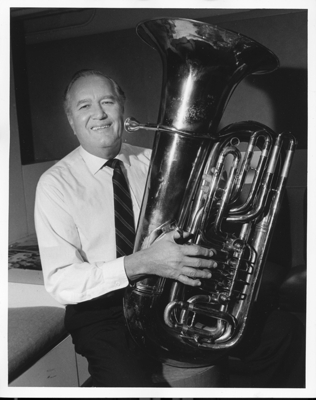Tel: +1 469 836 2108 | Email : drobnakbrass@gmail.com | Login
Herb Wekselblatt (1927-2019)
Tubist of the Metropolitan Opera Orchestra

Help support this website by buying me a cup of coffee!
Remembering Herb Wekselblatt, Accomplished Musician and Equal-Opportunity Pioneer
August 20, 2019
Herbert Wekselblatt, longstanding member of our Ethical Culture Society and a former principal tuba player with The Metropolitan Opera Orchestra, died on July 14 in Vero Beach, Florida. He was 92. Leader Joe Chuman notes that Herb and his first wife, Virginia, joined the Society more than 50 years ago. After the death of Virginia and his second wife, Vicki Reid, Herb moved to Monmouth County, traveling between there and a home in Florida.
“Herb was an extremely affable and friendly man, who always greeted those he knew with a smile. Though he long ago moved far from the Society, he maintained his membership and interest in the community and kept in contact in several ways throughout the years,” Joe said.
Obituary information provided by Herb’s oldest son, Michael, recounts that Herb was very active in the musicians union, the American Federation of Musicians, serving as both negotiating Committee Chairman and Assistant Committee Chairman during two periods of labor unrest, both times helping to achieve substantial wage, benefit, and working-condition improvements for the Met Orchestra. He had been called “the orchestra militant” in an extensive Opera News article concerning the 16-week lockout at The Met during the 1969-1970 season.
In addition he proposed, fought for, and achieved the “Blind Audition” process at The Met Opera in the 1960s. Opera and symphony orchestras nationally and around the globe were primarily occupied by men. Although some orchestras had the applicants play a first audition behind a screen, Herb’s system called for subsequent and final auditions to continue to take place behind a screen, ensuring the candidates remained anonymous. Any cough, clearing of the throat, or particular identifying noise made behind the screen other than the piece asked to be played would disqualify an applicant as it could be a possible tip-off to one of the judges about who they were.
Disqualified applicants were then given another candidate number and asked to play again later. Even the wearing of shoes on a bare floor where there was no carpet was addressed, because a woman wearing high heels might identify her gender and then not be heard on an equal basis as the male applicants, despite the way they played. Each judge including the conductor, got to cast one vote in a secret ballot, without discussion until the votes were counted. This opened the door not just for women but for the very best of musicians, female and male, to audition freely and on equal level.
There were only three women at the time in the Met Opera Orchestra of more than 100 musicians. Author Malcolm Gladwell included Herb Wekselblatt and this process in his best-selling book “Blink, The Power of Thinking Without Thinking.” At the very first “blind audition,” all four open violin positions were won by women. Herb recalled one fellow male orchestra member being furious at him, yelling “You’re going to be remembered as the SOB who brought women into this orchestra.” He considered it one of his most proud and lasting achievements and certainly made the Met Opera Orchestra possibly one the greatest orchestral ensembles in the world. Blind auditions have now become a standard in many other high-profile orchestras.
Recorded with Leonard Bernstein
Herb was born and grew up in Borough Park, Brooklyn. At age 16, three years after he started playing tuba, he was awarded a full scholarship to the Julliard School of Music. His first recordings came at age 20 under the conductors Leopold Stokowski and a very young rising star named Leonard Bernstein.
Other classical music icons he played for were Sir Thomas Beecham, Ernest Ansermet, Erich Leinsdorf, Carlos Kleiber, Karl Bohm, Herbert Von Karajan, James Levine, Dean Dixon, Leon Barzin, Bruno Walter, Paul Whitman, Fritz Reiner, Dimitri Mitropoulos, and Sir George Solti.
Before he joined the Met Opera orchestra, Herb preformed with the “Voice of Firestone Radio (later TV) Orchestra,” “The Symphony of the Air,” formerly known as the NBC Symphony, The Goldman Band, and the original Broadway production of “The Sound of Music,” starring Mary Martin. He was also a Navy veteran, serving in World War II and the Korean War.
In addition to his musical career, he published two books, “Solos for the Tuba” and “First Solos for the Tuba,” widely used internationally as a method book for aspiring artists.
Teacher and lifelong union member
After earning bachelor’s and master’s degrees from Columbia University and before his long tenure at the Met Opera, Herb was a teacher in the Uniondale and Hempstead, Long Island, school systems and served on the faculty of the Manhattan School of Music. He was a lifelong member of Local 802 and the American Federation of Musicians.
He is survived by his wife, Barbara; three sons, Michael, Daniel, and David; five grandchildren, and one great-grandson.
-Ethical Culture Society of Bergen County
